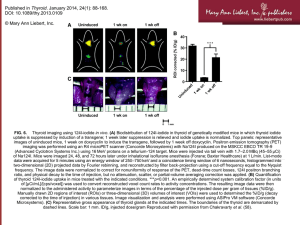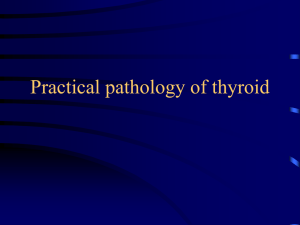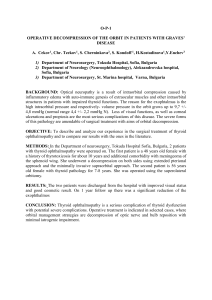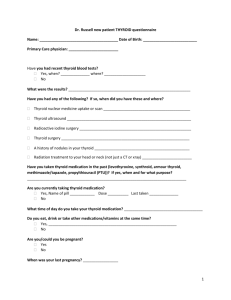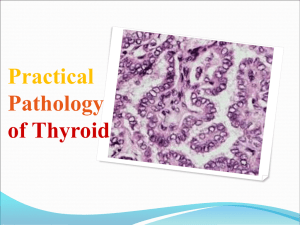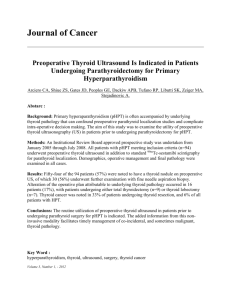Thyroid Health, Dr. John Douillard
advertisement
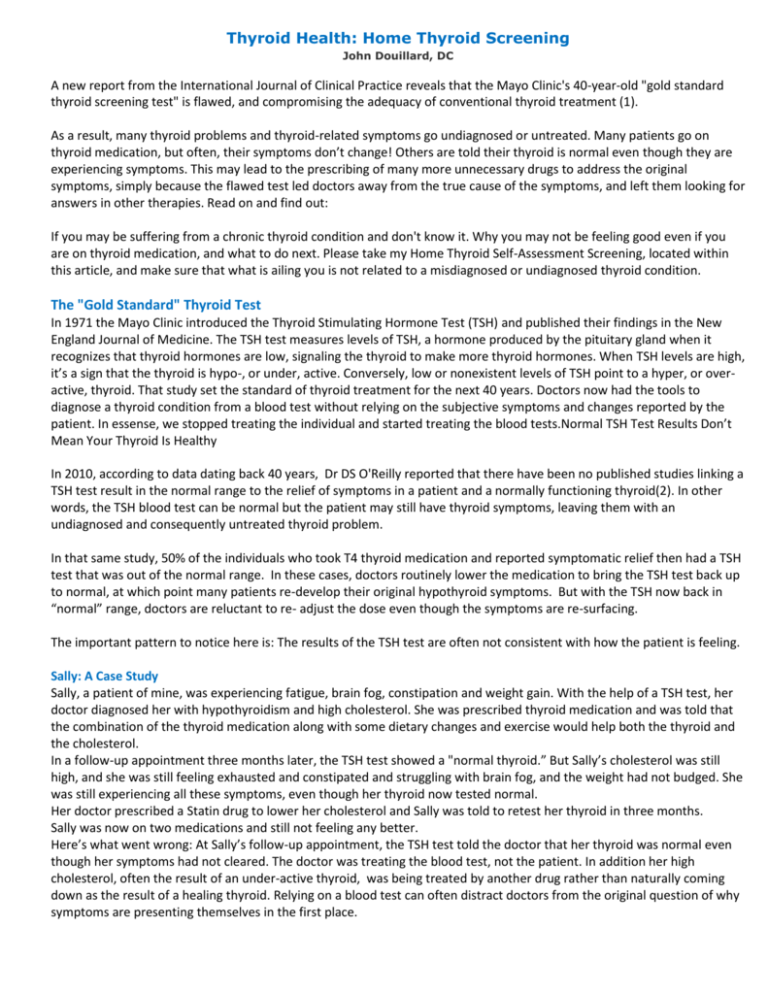
Thyroid Health: Home Thyroid Screening John Douillard, DC A new report from the International Journal of Clinical Practice reveals that the Mayo Clinic's 40-year-old "gold standard thyroid screening test" is flawed, and compromising the adequacy of conventional thyroid treatment (1). As a result, many thyroid problems and thyroid-related symptoms go undiagnosed or untreated. Many patients go on thyroid medication, but often, their symptoms don’t change! Others are told their thyroid is normal even though they are experiencing symptoms. This may lead to the prescribing of many more unnecessary drugs to address the original symptoms, simply because the flawed test led doctors away from the true cause of the symptoms, and left them looking for answers in other therapies. Read on and find out: If you may be suffering from a chronic thyroid condition and don't know it. Why you may not be feeling good even if you are on thyroid medication, and what to do next. Please take my Home Thyroid Self-Assessment Screening, located within this article, and make sure that what is ailing you is not related to a misdiagnosed or undiagnosed thyroid condition. The "Gold Standard" Thyroid Test In 1971 the Mayo Clinic introduced the Thyroid Stimulating Hormone Test (TSH) and published their findings in the New England Journal of Medicine. The TSH test measures levels of TSH, a hormone produced by the pituitary gland when it recognizes that thyroid hormones are low, signaling the thyroid to make more thyroid hormones. When TSH levels are high, it’s a sign that the thyroid is hypo-, or under, active. Conversely, low or nonexistent levels of TSH point to a hyper, or overactive, thyroid. That study set the standard of thyroid treatment for the next 40 years. Doctors now had the tools to diagnose a thyroid condition from a blood test without relying on the subjective symptoms and changes reported by the patient. In essense, we stopped treating the individual and started treating the blood tests.Normal TSH Test Results Don’t Mean Your Thyroid Is Healthy In 2010, according to data dating back 40 years, Dr DS O'Reilly reported that there have been no published studies linking a TSH test result in the normal range to the relief of symptoms in a patient and a normally functioning thyroid(2). In other words, the TSH blood test can be normal but the patient may still have thyroid symptoms, leaving them with an undiagnosed and consequently untreated thyroid problem. In that same study, 50% of the individuals who took T4 thyroid medication and reported symptomatic relief then had a TSH test that was out of the normal range. In these cases, doctors routinely lower the medication to bring the TSH test back up to normal, at which point many patients re-develop their original hypothyroid symptoms. But with the TSH now back in “normal” range, doctors are reluctant to re- adjust the dose even though the symptoms are re-surfacing. The important pattern to notice here is: The results of the TSH test are often not consistent with how the patient is feeling. Sally: A Case Study Sally, a patient of mine, was experiencing fatigue, brain fog, constipation and weight gain. With the help of a TSH test, her doctor diagnosed her with hypothyroidism and high cholesterol. She was prescribed thyroid medication and was told that the combination of the thyroid medication along with some dietary changes and exercise would help both the thyroid and the cholesterol. In a follow-up appointment three months later, the TSH test showed a "normal thyroid.” But Sally’s cholesterol was still high, and she was still feeling exhausted and constipated and struggling with brain fog, and the weight had not budged. She was still experiencing all these symptoms, even though her thyroid now tested normal. Her doctor prescribed a Statin drug to lower her cholesterol and Sally was told to retest her thyroid in three months. Sally was now on two medications and still not feeling any better. Here’s what went wrong: At Sally’s follow-up appointment, the TSH test told the doctor that her thyroid was normal even though her symptoms had not cleared. The doctor was treating the blood test, not the patient. In addition her high cholesterol, often the result of an under-active thyroid, was being treated by another drug rather than naturally coming down as the result of a healing thyroid. Relying on a blood test can often distract doctors from the original question of why symptoms are presenting themselves in the first place. Home Thyroid Self Assessment Screening Before blood tests were available, the thyroid was evaluated by basal body temperature and the signs and symptoms presented by the patient. Today these traditional tests have been replaced by modern blood tests. It has now become clear that these blood tests alone will not offer an accurate thyroid diagnosis. Use the Home Thyroid Self Assessment Screening below, along with the thyroid blood tests from your doctor, to get the most precise evaluation of your thyroid. Step 1: Morning Axillary Temperature Test Each morning before getting out of bed and before much movement, take your temperature under your arm (in your arm pit). Do this for 5 days and get the average temperature. It should be greater than 97 degrees F. If it is lower and you are experiencing some of the hypothyroid symptoms listed below, you may have sluggish thyroid function. Some digital thermometers are designed to take axillary (underarm) temperature. The old fashioned mercury thermometers also work well (shake down the thermometer before bed the night before, so you move as little as possible before taking your temperature in the morning). Step 2: Take the following yes-or-no questionnaire. • Are you fatigued or lethargic compared to how you’ve typically felt in the past? • Do you have aversion to or intolerance of cold? • Does your mind feel foggy? • Has your memory declined recently? • Do you have an increased need for sleep? • Are you experiencing slow and steady weight gain? • Are you constipated? • Do you have dry, coarse skin? • Have the outside thirds of your eyebrows become thinner? • Are you experiencing hair thinning or hair loss? • Do you have high cholesterol? • Is it difficult to get out of bed in the morning? • Is it difficult to enjoy life because it takes too much energy? • Do the muscles in your arms and legs cramp for no reason? • Do your joints hurt? • Do you find it difficult to concentrate? • Do you just feel "off" and can’t really explain it? • Are you fingers and toes always cold? • Are you feeling depressed? • Do you find yourself cancelling evening or weekend plans regularly because you just don't have the energy? All of the above are signs and symptoms of a low-functioning thyroid. If you answered "yes" to 5 or more of these questions and your first morning axillary temperature test is below 97 degrees, you may have a thyroid condition. If this is you, have your doctor run a Reverse T3 test. The most common marker for an undiagnosed low thyroid is a test called Reverse T3 (rT3). RT3 hormone is the reverse or opposite of the thyroid hormone T3. When rT3 levels are high it will slow the thyroid and is commonly found in hypothyroism. Most doctors don’t run this test so you must ask for it. Thyroid Dysfunction and Toxic Metals Interestingly, Dr. Jonathan Wright reported that elevated rT3 levels may be linked to elevated levels of toxic metals. When the toxic metals are removed by oral chelation, the rT3 returns to normal. The thyroid is an extremly chemically sensitive gland and detoxing the thyroid must be considered in the treatment of most thyroid conditions. For more information about oral chelation, click here. Need More Help? Over the years I have helped many patients balance their thyroid hormones. During a consult with me, I will evaluate your symptoms, test results and prescriptions. Based on your unique needs, I will suggest lifestyle protocols, such as Ayurvedic herbs, diet, and stress reduction practices. To schedule, please call 303.516.4848. I look forward to guiding you towards a healthy thyroid. Sources: Dr Jonathan V. Wright's Nutrition and Healing. Vol.18, Issue 3, May 2011. The Mayo Clinic "advancement" that’s kept hypothyroid treatment stuck in the dark ages. References: O'Reilly D St J. Thyroid Hormone Replacement: An Iatrogenic Problem. Int J Clin Pract. June 2010;64(7):991-994.

